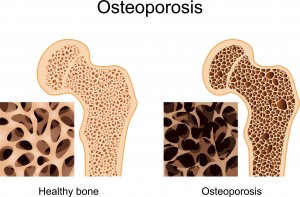Patients with osteoporosis (bone loss or changes to bone structure) often take a drug to help with their condition. If you have osteoporosis, be sure to talk to your dentist about your condition and disclose any medications you’re prescribed. This is important because a rare but serious condition called osteonecrosis can occur while taking certain drugs at the same time as undergoing certain dental procedures.
While osteonecrosis of the jaw can occur without cause, it’s more common after dental procedures such as a tooth extraction other procedure that affects the bone or surrounding tissues.
When you have osteoporosis and are taking medication, it’s very important to see your dentist. They will establish the best oral health maintenance or treatment plan based on your conditions. Most importantly, your dentist will also help identify ways to lessen the risk of osteonecrosis.
Osteoporosis and Dental Prosthesis
Bone loss due to osteoporosis may become so severe that it may become impossible to create functional dentures. Without the aid of dentures to chew many types of food, older patients may suffer severe nutritional deficiencies. In addition, ill-fitting dentures can lead to mouth sores and difficulty while speaking. Osteoporosis has also been suggested as a risk factor in dental implant failure, but data supporting such a link are limited the effect of osteoporosis on both oral and general health needs to be well understood. As a health care provider, the dentist could serve as a pre screener of patients with the potential for osteoporosis. Familiarity with the risk factors could aid in identifying these individuals and help in earlier diagnosis. Many of the studies conducted to date suggest there is a relationship between osteoporosis and oral health but these studies have been plagued by relatively small sample sizes and lack of adequate control of potential confounding variables such as gender, hormone intake, smoking, race, age, stress and distress, diet, body mass and exercise.

- Home
- About Us
- Services
- Dental Lifestyle
- Wedding Smiles
- Gallery
- Contact Us
+91 1724648877
+91 9015455577
Clinic Timings
Mon - Sat - 9.30 AM to 2.00 PM
4.00 PM to 7.00 PM
Sunday By Prior Appointment
+91 9015455577
Clinic Timings
Mon - Sat - 9.30 AM to 2.00 PM
4.00 PM to 7.00 PM
Sunday By Prior Appointment



